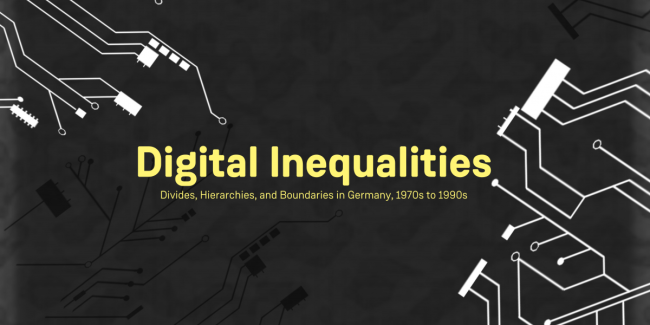Verbundprojekt
des Leibniz-Zentrums für Zeithistorische Forschung Potsdam (ZZF) in Kooperation mit dem Leibniz-Institut für Bildungsmedien | Georg-Eckert-Institut (GEI) und der Hochschule des Bundes für öffentliche Verwaltung (HS Bund)
Projektleitung: Michael Homberg
Beginn des Projektes: Juli 2023
Gefördert von der Leibniz-Gemeinschaft, Förderlinie „Kooperative Exzellenz“ (2023)
Dissertationsprojekte am ZZF Potsdam:
- Programmed Inequality. New Technologies, Old Barriers – Computers and Women, Nina Neuscheler
- Digital Borders und die Entstehung eines digitalen Migrationssystems in Deutschland und Westeuropa von den späten 1960er Jahren bis ins frühe 21. Jh., Lennart V. Schmidt
Die Digitalisierung der Gesellschaft mit ihren tiefgreifenden sozialen, politischen, ökonomischen und kulturellen Auswirkungen wird häufig als Emanzipationsgeschichte erzählt. Allerdings sind in diesem Prozess auch neue Trennlinien und Hierarchien entstanden, wodurch gesellschaftliche Ungleichheiten und Machtgefälle reproduziert oder verschärft werden. Das Projekt will sich diesen bislang wenig thematisierten Schattenseiten der Digitalisierung widmen und erforschen, wie sich die teilweise verborgenen Voreingenommenheiten der technologischen Systeme in der Arbeitswelt, den Geschlechterverhältnissen, im Bildungssystem und in Migrationsregimen auswirken.
Am ZZF sind drei Forschungsvorhaben unter der Leitung von Michael Homberg angesiedelt, die sich den Grenzen, Bruchlinien und Gräben der „digitalen Gesellschaft“ widmen. Johannes Kleinmann wird den Siegeszug neuer digitaler Experten und digitalen Knowhows in den Arbeitswelten untersuchen. Er erkundet, wie sich Konzepte von Führung und Management, betriebsinterne Strukturen und Hierarchien und konkrete Arbeitsprozesse im Zuge des digitalen Wandels veränderten, und welche sozialen Ungleichheiten dieser Wandel zeitigte (TP „A Class of Experts? Computer Work and its Hierarchies“). Nina Neuscheler wird die Verbreitung von Computern in den Lebens- und Arbeitswelten in Bundesrepublik und DDR in geschlechterhistorischer Perspektive erforschen und dazu in besonderer Weise eruieren, welche Rolle Frauen im beginnenden digitalen Zeitalter spielten – sowohl als Pionierinnen in Informatik und Computerindustrie als auch als Anwenderinnen (TP „Programmed Inequality. New Technologies, Old Barriers – Computers and Women“). Lennart V. Schmidt wird schließlich den Einsatz digitaler Technologien in Polizei und Nachrichtendiensten zur Steuerung und Kontrolle von Bevölkerungsbewegungen untersuchen und hierzu den Wandel von Migrationspolitik- und -wissen sowohl hinsichtlich der zeitgenössischen Wahrnehmung von Bedrohungslagen als auch der rechtlichen Regelung und bürokratischen Praxis des Grenzschutzes analysieren (TP „Digital Borders: Computers, Statistics and Migration Regimes“, in Kooperation mit der HS Bund). Am GEI wird zudem Tim Schinschick die politischen und pädagogischen Diskurse zu Einführung und Auswirkungen der neuen digitalen Technologien einschließlich der Unterrichtspraktiken in deutschen Schulen untersuchen (TP „New Digital Technologies in the Contexts of School and Society“). Gemeinsam analysieren die Forschungsvorhaben den deutsch-deutschen Fall in transnationaler Perspektive.
Für mehr Informationen zum Verbundprojekt Digital Inequalities besuchen Sie die Projekt-Website unter: https://digital-inequalities.com
With the advent of digital technologies in the 20th century, our living and working worlds have fundamentally changed – with far-reaching social, political, economic, and cultural consequences. From a 21st century’s perspective, these changes have been labelled as the rise of a new, “digital society”. According to its founding myths, this society is based on an emancipatory use of technology, universal access and new ways of interactivity. However, against all utopian dreams linked to the “computer revolution”, the digital society quickly developed its own hierarchies, building new digital walls and causing new digital divides. This project takes up the German case in its transnational contexts to raise the question how and why such divides, hierarchies and boundaries occurred. By analyzing how computers and digital media since the 1970s developed, it trains a spotlight on the inequality, marginalization and biases woven into our technological systems. Thus, it asks how digital devices were technically implemented, socially prepared and discursively negotiated. Exploring the structural preconditions, diverging manifestations and individual experiences of digital inequalities, it combines social, political, economic and cultural history approaches to understand the (hidden) power dynamics and labor circuits behind digitalization. To this end, the case studies will exemplarily analyze how digital technologies originated new experts and knowledge regimes, how computers altered gender and class relations in the emerging digital society, how educational technologies conquered German classrooms and in which pedagogical practices they were embedded, and how databanks and digital networks channeled migration processes and helped building border regimes. With that, the project will further our understanding of the digital age and develop new, critical perspectives on central contemporary history issues.
For more information on the joint project Digital Inequalities, please visit the project website at: https://digital-inequalities.com

